MSWPG7212 Assignment 2: Organisational Culture and Management Project
VerifiedAdded on 2023/06/04
|5
|2232
|259
Project
AI Summary
This project analyzes organizational culture and management within human service organizations, focusing on two key management theories: administrative management and Theory X and Theory Y. The student describes each theory, providing links to theoretical literature and examples of their implementation in a community center, the focus agency. The project critically analyzes the benefits and challenges of each management approach, discussing the advantages and disadvantages of administrative management, such as its comprehensive nature versus its reliance on human factors and varying perceptions. Similarly, it examines the benefits of McGregor's Theory X and Y, including their clarity and ease of understanding, while also addressing the limitations, such as potential hostility and the difficulty of maintaining the ideal nature of Theory Y in real-world scenarios. The project incorporates relevant references to support the analysis and demonstrates an understanding of how these theories impact organizational dynamics and effectiveness in the human service sector.
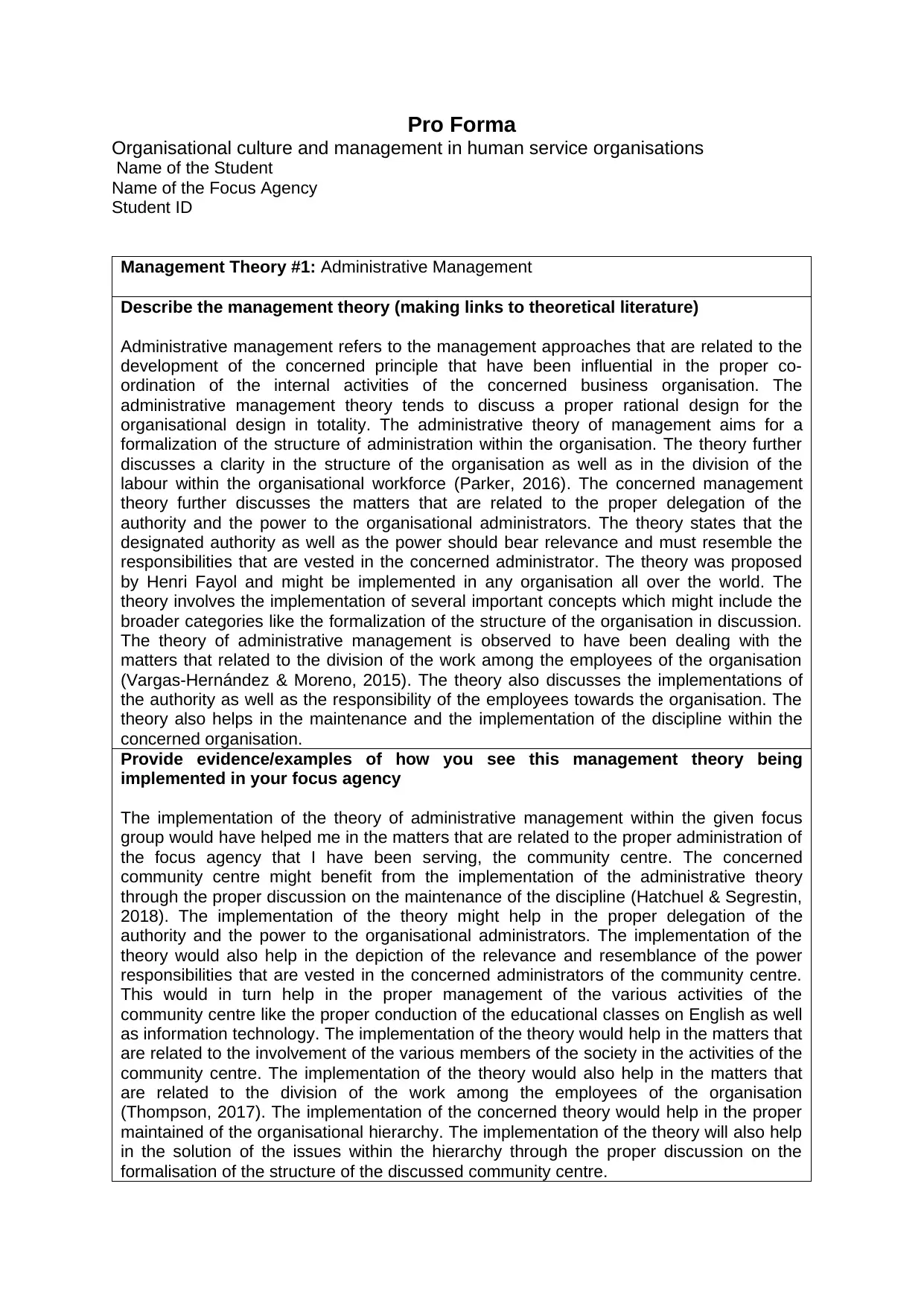
Pro Forma
Organisational culture and management in human service organisations
Name of the Student
Name of the Focus Agency
Student ID
Management Theory #1: Administrative Management
Describe the management theory (making links to theoretical literature)
Administrative management refers to the management approaches that are related to the
development of the concerned principle that have been influential in the proper co-
ordination of the internal activities of the concerned business organisation. The
administrative management theory tends to discuss a proper rational design for the
organisational design in totality. The administrative theory of management aims for a
formalization of the structure of administration within the organisation. The theory further
discusses a clarity in the structure of the organisation as well as in the division of the
labour within the organisational workforce (Parker, 2016). The concerned management
theory further discusses the matters that are related to the proper delegation of the
authority and the power to the organisational administrators. The theory states that the
designated authority as well as the power should bear relevance and must resemble the
responsibilities that are vested in the concerned administrator. The theory was proposed
by Henri Fayol and might be implemented in any organisation all over the world. The
theory involves the implementation of several important concepts which might include the
broader categories like the formalization of the structure of the organisation in discussion.
The theory of administrative management is observed to have been dealing with the
matters that related to the division of the work among the employees of the organisation
(Vargas-Hernández & Moreno, 2015). The theory also discusses the implementations of
the authority as well as the responsibility of the employees towards the organisation. The
theory also helps in the maintenance and the implementation of the discipline within the
concerned organisation.
Provide evidence/examples of how you see this management theory being
implemented in your focus agency
The implementation of the theory of administrative management within the given focus
group would have helped me in the matters that are related to the proper administration of
the focus agency that I have been serving, the community centre. The concerned
community centre might benefit from the implementation of the administrative theory
through the proper discussion on the maintenance of the discipline (Hatchuel & Segrestin,
2018). The implementation of the theory might help in the proper delegation of the
authority and the power to the organisational administrators. The implementation of the
theory would also help in the depiction of the relevance and resemblance of the power
responsibilities that are vested in the concerned administrators of the community centre.
This would in turn help in the proper management of the various activities of the
community centre like the proper conduction of the educational classes on English as well
as information technology. The implementation of the theory would help in the matters that
are related to the involvement of the various members of the society in the activities of the
community centre. The implementation of the theory would also help in the matters that
are related to the division of the work among the employees of the organisation
(Thompson, 2017). The implementation of the concerned theory would help in the proper
maintained of the organisational hierarchy. The implementation of the theory will also help
in the solution of the issues within the hierarchy through the proper discussion on the
formalisation of the structure of the discussed community centre.
Organisational culture and management in human service organisations
Name of the Student
Name of the Focus Agency
Student ID
Management Theory #1: Administrative Management
Describe the management theory (making links to theoretical literature)
Administrative management refers to the management approaches that are related to the
development of the concerned principle that have been influential in the proper co-
ordination of the internal activities of the concerned business organisation. The
administrative management theory tends to discuss a proper rational design for the
organisational design in totality. The administrative theory of management aims for a
formalization of the structure of administration within the organisation. The theory further
discusses a clarity in the structure of the organisation as well as in the division of the
labour within the organisational workforce (Parker, 2016). The concerned management
theory further discusses the matters that are related to the proper delegation of the
authority and the power to the organisational administrators. The theory states that the
designated authority as well as the power should bear relevance and must resemble the
responsibilities that are vested in the concerned administrator. The theory was proposed
by Henri Fayol and might be implemented in any organisation all over the world. The
theory involves the implementation of several important concepts which might include the
broader categories like the formalization of the structure of the organisation in discussion.
The theory of administrative management is observed to have been dealing with the
matters that related to the division of the work among the employees of the organisation
(Vargas-Hernández & Moreno, 2015). The theory also discusses the implementations of
the authority as well as the responsibility of the employees towards the organisation. The
theory also helps in the maintenance and the implementation of the discipline within the
concerned organisation.
Provide evidence/examples of how you see this management theory being
implemented in your focus agency
The implementation of the theory of administrative management within the given focus
group would have helped me in the matters that are related to the proper administration of
the focus agency that I have been serving, the community centre. The concerned
community centre might benefit from the implementation of the administrative theory
through the proper discussion on the maintenance of the discipline (Hatchuel & Segrestin,
2018). The implementation of the theory might help in the proper delegation of the
authority and the power to the organisational administrators. The implementation of the
theory would also help in the depiction of the relevance and resemblance of the power
responsibilities that are vested in the concerned administrators of the community centre.
This would in turn help in the proper management of the various activities of the
community centre like the proper conduction of the educational classes on English as well
as information technology. The implementation of the theory would help in the matters that
are related to the involvement of the various members of the society in the activities of the
community centre. The implementation of the theory would also help in the matters that
are related to the division of the work among the employees of the organisation
(Thompson, 2017). The implementation of the concerned theory would help in the proper
maintained of the organisational hierarchy. The implementation of the theory will also help
in the solution of the issues within the hierarchy through the proper discussion on the
formalisation of the structure of the discussed community centre.
Paraphrase This Document
Need a fresh take? Get an instant paraphrase of this document with our AI Paraphraser
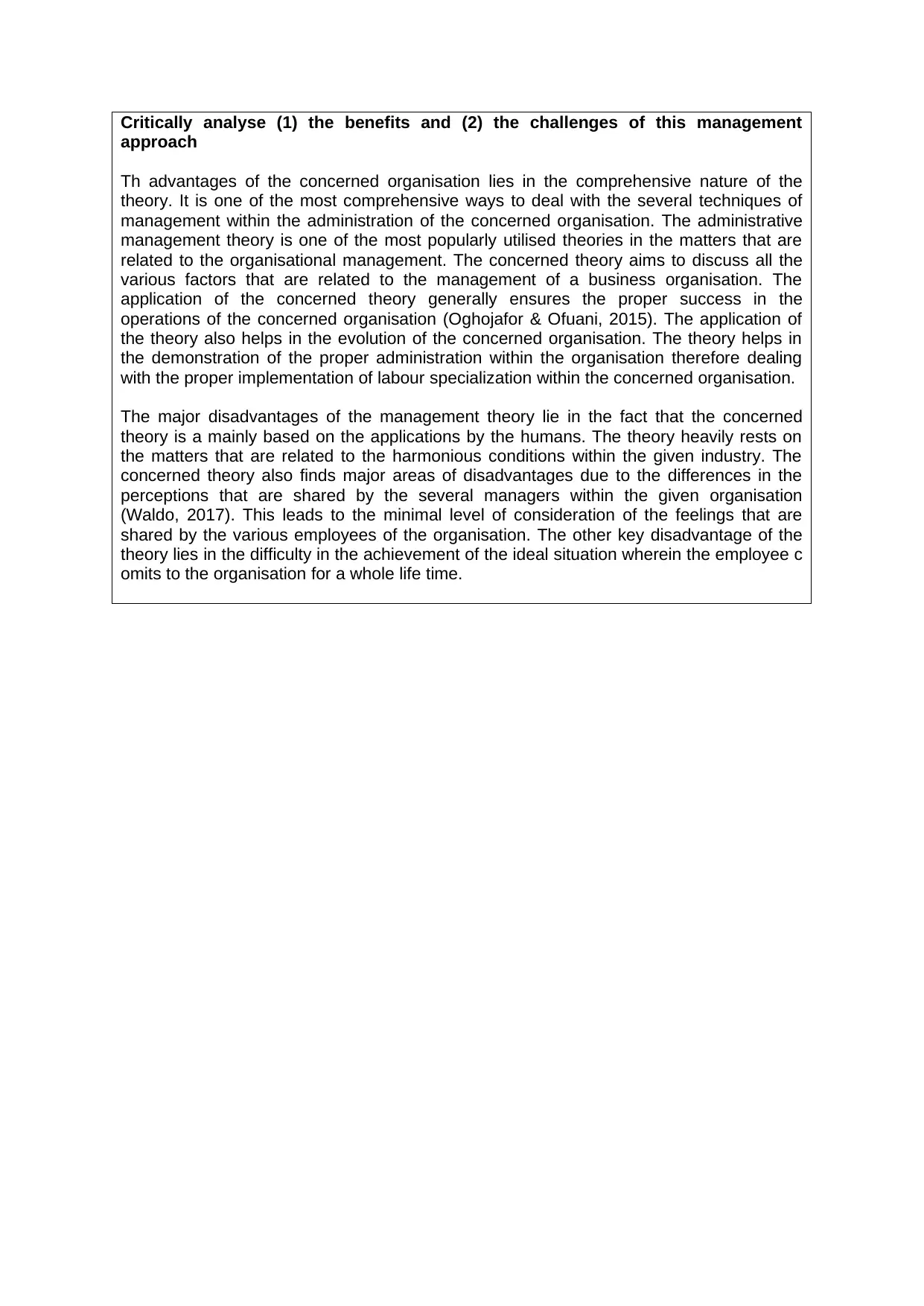
Critically analyse (1) the benefits and (2) the challenges of this management
approach
Th advantages of the concerned organisation lies in the comprehensive nature of the
theory. It is one of the most comprehensive ways to deal with the several techniques of
management within the administration of the concerned organisation. The administrative
management theory is one of the most popularly utilised theories in the matters that are
related to the organisational management. The concerned theory aims to discuss all the
various factors that are related to the management of a business organisation. The
application of the concerned theory generally ensures the proper success in the
operations of the concerned organisation (Oghojafor & Ofuani, 2015). The application of
the theory also helps in the evolution of the concerned organisation. The theory helps in
the demonstration of the proper administration within the organisation therefore dealing
with the proper implementation of labour specialization within the concerned organisation.
The major disadvantages of the management theory lie in the fact that the concerned
theory is a mainly based on the applications by the humans. The theory heavily rests on
the matters that are related to the harmonious conditions within the given industry. The
concerned theory also finds major areas of disadvantages due to the differences in the
perceptions that are shared by the several managers within the given organisation
(Waldo, 2017). This leads to the minimal level of consideration of the feelings that are
shared by the various employees of the organisation. The other key disadvantage of the
theory lies in the difficulty in the achievement of the ideal situation wherein the employee c
omits to the organisation for a whole life time.
approach
Th advantages of the concerned organisation lies in the comprehensive nature of the
theory. It is one of the most comprehensive ways to deal with the several techniques of
management within the administration of the concerned organisation. The administrative
management theory is one of the most popularly utilised theories in the matters that are
related to the organisational management. The concerned theory aims to discuss all the
various factors that are related to the management of a business organisation. The
application of the concerned theory generally ensures the proper success in the
operations of the concerned organisation (Oghojafor & Ofuani, 2015). The application of
the theory also helps in the evolution of the concerned organisation. The theory helps in
the demonstration of the proper administration within the organisation therefore dealing
with the proper implementation of labour specialization within the concerned organisation.
The major disadvantages of the management theory lie in the fact that the concerned
theory is a mainly based on the applications by the humans. The theory heavily rests on
the matters that are related to the harmonious conditions within the given industry. The
concerned theory also finds major areas of disadvantages due to the differences in the
perceptions that are shared by the several managers within the given organisation
(Waldo, 2017). This leads to the minimal level of consideration of the feelings that are
shared by the various employees of the organisation. The other key disadvantage of the
theory lies in the difficulty in the achievement of the ideal situation wherein the employee c
omits to the organisation for a whole life time.
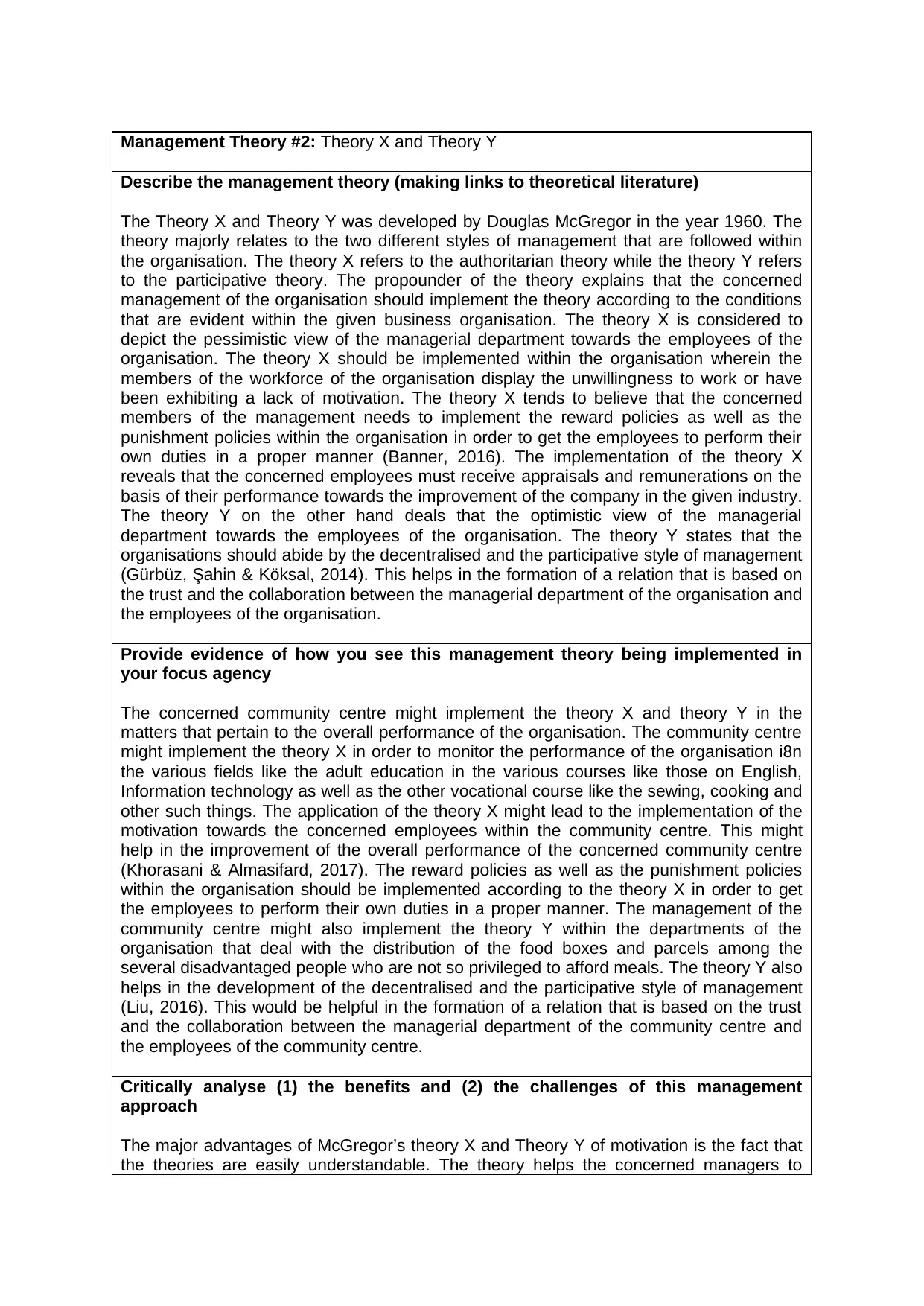
Management Theory #2: Theory X and Theory Y
Describe the management theory (making links to theoretical literature)
The Theory X and Theory Y was developed by Douglas McGregor in the year 1960. The
theory majorly relates to the two different styles of management that are followed within
the organisation. The theory X refers to the authoritarian theory while the theory Y refers
to the participative theory. The propounder of the theory explains that the concerned
management of the organisation should implement the theory according to the conditions
that are evident within the given business organisation. The theory X is considered to
depict the pessimistic view of the managerial department towards the employees of the
organisation. The theory X should be implemented within the organisation wherein the
members of the workforce of the organisation display the unwillingness to work or have
been exhibiting a lack of motivation. The theory X tends to believe that the concerned
members of the management needs to implement the reward policies as well as the
punishment policies within the organisation in order to get the employees to perform their
own duties in a proper manner (Banner, 2016). The implementation of the theory X
reveals that the concerned employees must receive appraisals and remunerations on the
basis of their performance towards the improvement of the company in the given industry.
The theory Y on the other hand deals that the optimistic view of the managerial
department towards the employees of the organisation. The theory Y states that the
organisations should abide by the decentralised and the participative style of management
(Gürbüz, Şahin & Köksal, 2014). This helps in the formation of a relation that is based on
the trust and the collaboration between the managerial department of the organisation and
the employees of the organisation.
Provide evidence of how you see this management theory being implemented in
your focus agency
The concerned community centre might implement the theory X and theory Y in the
matters that pertain to the overall performance of the organisation. The community centre
might implement the theory X in order to monitor the performance of the organisation i8n
the various fields like the adult education in the various courses like those on English,
Information technology as well as the other vocational course like the sewing, cooking and
other such things. The application of the theory X might lead to the implementation of the
motivation towards the concerned employees within the community centre. This might
help in the improvement of the overall performance of the concerned community centre
(Khorasani & Almasifard, 2017). The reward policies as well as the punishment policies
within the organisation should be implemented according to the theory X in order to get
the employees to perform their own duties in a proper manner. The management of the
community centre might also implement the theory Y within the departments of the
organisation that deal with the distribution of the food boxes and parcels among the
several disadvantaged people who are not so privileged to afford meals. The theory Y also
helps in the development of the decentralised and the participative style of management
(Liu, 2016). This would be helpful in the formation of a relation that is based on the trust
and the collaboration between the managerial department of the community centre and
the employees of the community centre.
Critically analyse (1) the benefits and (2) the challenges of this management
approach
The major advantages of McGregor’s theory X and Theory Y of motivation is the fact that
the theories are easily understandable. The theory helps the concerned managers to
Describe the management theory (making links to theoretical literature)
The Theory X and Theory Y was developed by Douglas McGregor in the year 1960. The
theory majorly relates to the two different styles of management that are followed within
the organisation. The theory X refers to the authoritarian theory while the theory Y refers
to the participative theory. The propounder of the theory explains that the concerned
management of the organisation should implement the theory according to the conditions
that are evident within the given business organisation. The theory X is considered to
depict the pessimistic view of the managerial department towards the employees of the
organisation. The theory X should be implemented within the organisation wherein the
members of the workforce of the organisation display the unwillingness to work or have
been exhibiting a lack of motivation. The theory X tends to believe that the concerned
members of the management needs to implement the reward policies as well as the
punishment policies within the organisation in order to get the employees to perform their
own duties in a proper manner (Banner, 2016). The implementation of the theory X
reveals that the concerned employees must receive appraisals and remunerations on the
basis of their performance towards the improvement of the company in the given industry.
The theory Y on the other hand deals that the optimistic view of the managerial
department towards the employees of the organisation. The theory Y states that the
organisations should abide by the decentralised and the participative style of management
(Gürbüz, Şahin & Köksal, 2014). This helps in the formation of a relation that is based on
the trust and the collaboration between the managerial department of the organisation and
the employees of the organisation.
Provide evidence of how you see this management theory being implemented in
your focus agency
The concerned community centre might implement the theory X and theory Y in the
matters that pertain to the overall performance of the organisation. The community centre
might implement the theory X in order to monitor the performance of the organisation i8n
the various fields like the adult education in the various courses like those on English,
Information technology as well as the other vocational course like the sewing, cooking and
other such things. The application of the theory X might lead to the implementation of the
motivation towards the concerned employees within the community centre. This might
help in the improvement of the overall performance of the concerned community centre
(Khorasani & Almasifard, 2017). The reward policies as well as the punishment policies
within the organisation should be implemented according to the theory X in order to get
the employees to perform their own duties in a proper manner. The management of the
community centre might also implement the theory Y within the departments of the
organisation that deal with the distribution of the food boxes and parcels among the
several disadvantaged people who are not so privileged to afford meals. The theory Y also
helps in the development of the decentralised and the participative style of management
(Liu, 2016). This would be helpful in the formation of a relation that is based on the trust
and the collaboration between the managerial department of the community centre and
the employees of the community centre.
Critically analyse (1) the benefits and (2) the challenges of this management
approach
The major advantages of McGregor’s theory X and Theory Y of motivation is the fact that
the theories are easily understandable. The theory helps the concerned managers to
⊘ This is a preview!⊘
Do you want full access?
Subscribe today to unlock all pages.

Trusted by 1+ million students worldwide
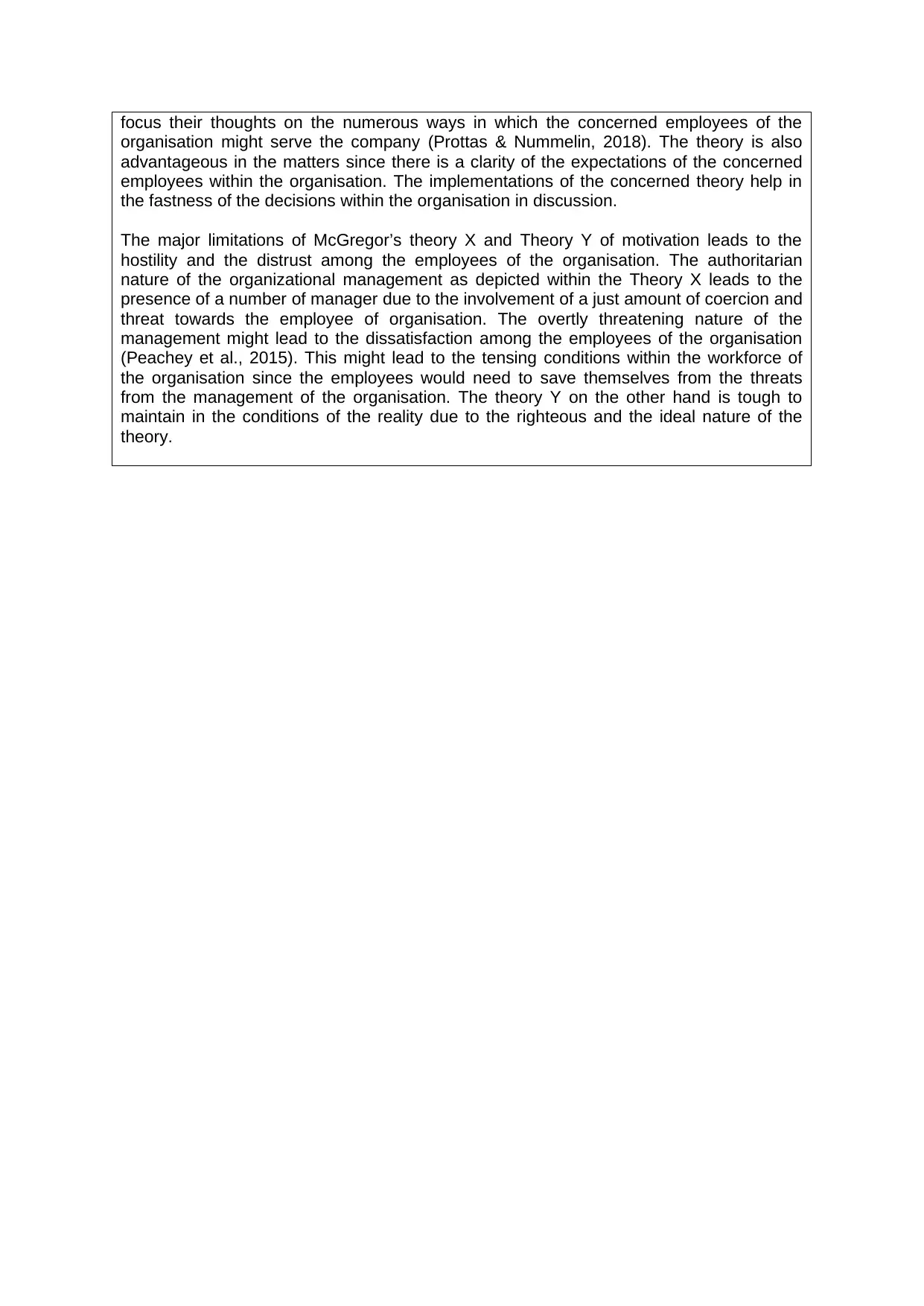
focus their thoughts on the numerous ways in which the concerned employees of the
organisation might serve the company (Prottas & Nummelin, 2018). The theory is also
advantageous in the matters since there is a clarity of the expectations of the concerned
employees within the organisation. The implementations of the concerned theory help in
the fastness of the decisions within the organisation in discussion.
The major limitations of McGregor’s theory X and Theory Y of motivation leads to the
hostility and the distrust among the employees of the organisation. The authoritarian
nature of the organizational management as depicted within the Theory X leads to the
presence of a number of manager due to the involvement of a just amount of coercion and
threat towards the employee of organisation. The overtly threatening nature of the
management might lead to the dissatisfaction among the employees of the organisation
(Peachey et al., 2015). This might lead to the tensing conditions within the workforce of
the organisation since the employees would need to save themselves from the threats
from the management of the organisation. The theory Y on the other hand is tough to
maintain in the conditions of the reality due to the righteous and the ideal nature of the
theory.
organisation might serve the company (Prottas & Nummelin, 2018). The theory is also
advantageous in the matters since there is a clarity of the expectations of the concerned
employees within the organisation. The implementations of the concerned theory help in
the fastness of the decisions within the organisation in discussion.
The major limitations of McGregor’s theory X and Theory Y of motivation leads to the
hostility and the distrust among the employees of the organisation. The authoritarian
nature of the organizational management as depicted within the Theory X leads to the
presence of a number of manager due to the involvement of a just amount of coercion and
threat towards the employee of organisation. The overtly threatening nature of the
management might lead to the dissatisfaction among the employees of the organisation
(Peachey et al., 2015). This might lead to the tensing conditions within the workforce of
the organisation since the employees would need to save themselves from the threats
from the management of the organisation. The theory Y on the other hand is tough to
maintain in the conditions of the reality due to the righteous and the ideal nature of the
theory.
Paraphrase This Document
Need a fresh take? Get an instant paraphrase of this document with our AI Paraphraser
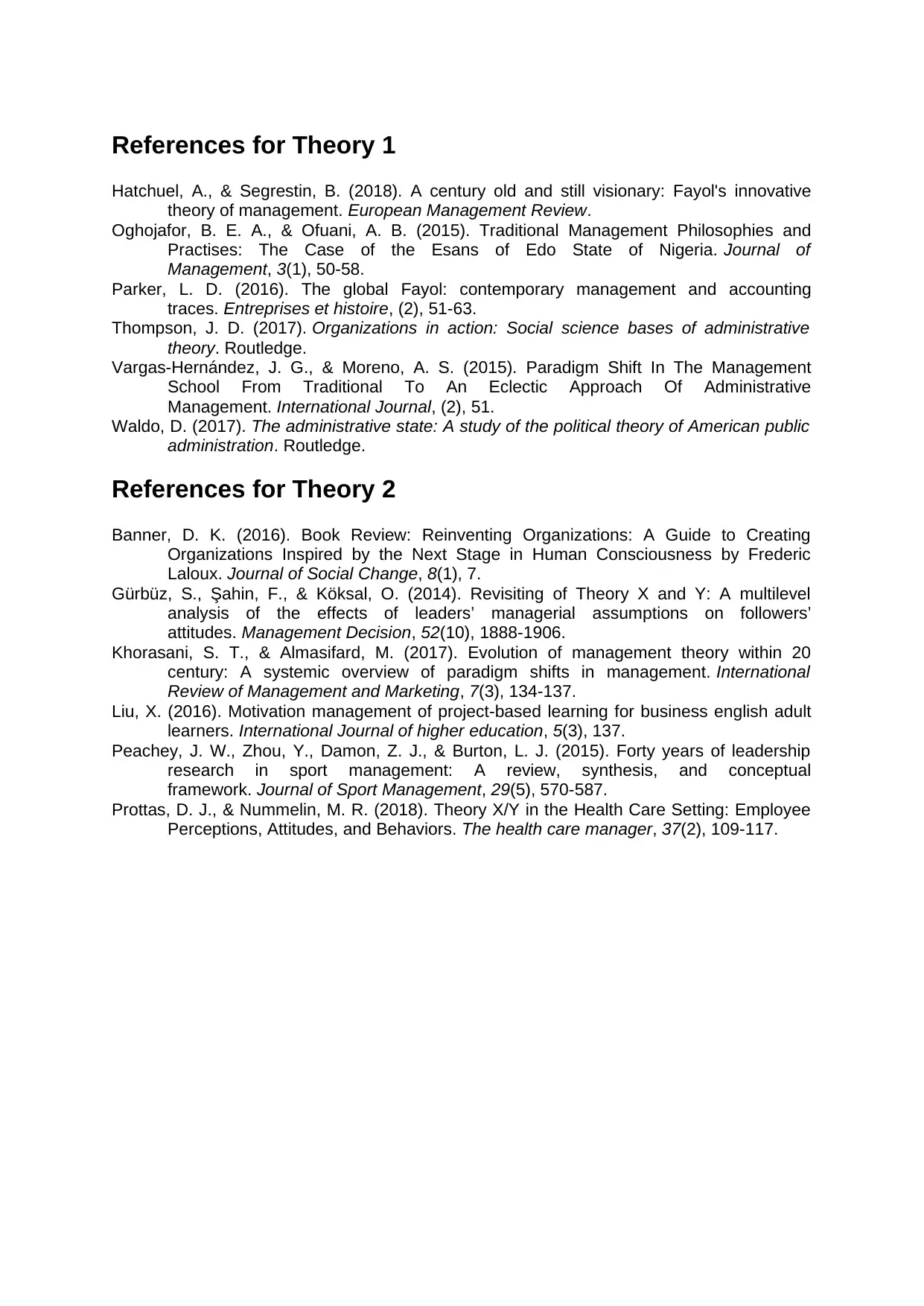
References for Theory 1
Hatchuel, A., & Segrestin, B. (2018). A century old and still visionary: Fayol's innovative
theory of management. European Management Review.
Oghojafor, B. E. A., & Ofuani, A. B. (2015). Traditional Management Philosophies and
Practises: The Case of the Esans of Edo State of Nigeria. Journal of
Management, 3(1), 50-58.
Parker, L. D. (2016). The global Fayol: contemporary management and accounting
traces. Entreprises et histoire, (2), 51-63.
Thompson, J. D. (2017). Organizations in action: Social science bases of administrative
theory. Routledge.
Vargas-Hernández, J. G., & Moreno, A. S. (2015). Paradigm Shift In The Management
School From Traditional To An Eclectic Approach Of Administrative
Management. International Journal, (2), 51.
Waldo, D. (2017). The administrative state: A study of the political theory of American public
administration. Routledge.
References for Theory 2
Banner, D. K. (2016). Book Review: Reinventing Organizations: A Guide to Creating
Organizations Inspired by the Next Stage in Human Consciousness by Frederic
Laloux. Journal of Social Change, 8(1), 7.
Gürbüz, S., Şahin, F., & Köksal, O. (2014). Revisiting of Theory X and Y: A multilevel
analysis of the effects of leaders’ managerial assumptions on followers’
attitudes. Management Decision, 52(10), 1888-1906.
Khorasani, S. T., & Almasifard, M. (2017). Evolution of management theory within 20
century: A systemic overview of paradigm shifts in management. International
Review of Management and Marketing, 7(3), 134-137.
Liu, X. (2016). Motivation management of project-based learning for business english adult
learners. International Journal of higher education, 5(3), 137.
Peachey, J. W., Zhou, Y., Damon, Z. J., & Burton, L. J. (2015). Forty years of leadership
research in sport management: A review, synthesis, and conceptual
framework. Journal of Sport Management, 29(5), 570-587.
Prottas, D. J., & Nummelin, M. R. (2018). Theory X/Y in the Health Care Setting: Employee
Perceptions, Attitudes, and Behaviors. The health care manager, 37(2), 109-117.
Hatchuel, A., & Segrestin, B. (2018). A century old and still visionary: Fayol's innovative
theory of management. European Management Review.
Oghojafor, B. E. A., & Ofuani, A. B. (2015). Traditional Management Philosophies and
Practises: The Case of the Esans of Edo State of Nigeria. Journal of
Management, 3(1), 50-58.
Parker, L. D. (2016). The global Fayol: contemporary management and accounting
traces. Entreprises et histoire, (2), 51-63.
Thompson, J. D. (2017). Organizations in action: Social science bases of administrative
theory. Routledge.
Vargas-Hernández, J. G., & Moreno, A. S. (2015). Paradigm Shift In The Management
School From Traditional To An Eclectic Approach Of Administrative
Management. International Journal, (2), 51.
Waldo, D. (2017). The administrative state: A study of the political theory of American public
administration. Routledge.
References for Theory 2
Banner, D. K. (2016). Book Review: Reinventing Organizations: A Guide to Creating
Organizations Inspired by the Next Stage in Human Consciousness by Frederic
Laloux. Journal of Social Change, 8(1), 7.
Gürbüz, S., Şahin, F., & Köksal, O. (2014). Revisiting of Theory X and Y: A multilevel
analysis of the effects of leaders’ managerial assumptions on followers’
attitudes. Management Decision, 52(10), 1888-1906.
Khorasani, S. T., & Almasifard, M. (2017). Evolution of management theory within 20
century: A systemic overview of paradigm shifts in management. International
Review of Management and Marketing, 7(3), 134-137.
Liu, X. (2016). Motivation management of project-based learning for business english adult
learners. International Journal of higher education, 5(3), 137.
Peachey, J. W., Zhou, Y., Damon, Z. J., & Burton, L. J. (2015). Forty years of leadership
research in sport management: A review, synthesis, and conceptual
framework. Journal of Sport Management, 29(5), 570-587.
Prottas, D. J., & Nummelin, M. R. (2018). Theory X/Y in the Health Care Setting: Employee
Perceptions, Attitudes, and Behaviors. The health care manager, 37(2), 109-117.
1 out of 5
Related Documents
Your All-in-One AI-Powered Toolkit for Academic Success.
+13062052269
info@desklib.com
Available 24*7 on WhatsApp / Email
![[object Object]](/_next/static/media/star-bottom.7253800d.svg)
Unlock your academic potential
Copyright © 2020–2025 A2Z Services. All Rights Reserved. Developed and managed by ZUCOL.




